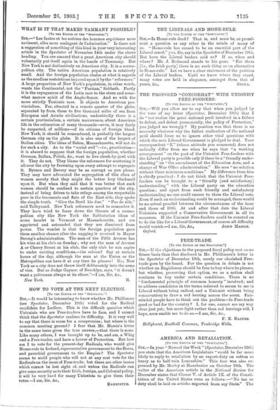WHAT IS IT THAT MAKES TA MMANY POSSIBLE ? r . T.
THY EDITOR Of TEE "SPECTATOR.'] Sm,—" Les fautes et les sottises des hommea supezieurs none ravissent, elles nous soulagent de l'admiration." Is there not a suggestion of something of this kind in your very interesting article in the Spectator of November 14th under the above heading. You are amazed that a great American city should voluntarily put itself again in the hands of Tammany. But New York is not distinctively an American city. It is a cosmo- politan city. The native American population is relatively small. And the foreign population chafes at what it regards as the needless restrictions imposed upon it by the " reformers." A large proportion of New York's population, in other words, wants the Continental, not the " Puritan," Sabbath. Partly it is the repugnance of the Latin race to the stern and some- what narrow spirit of the Anglo-Saxon. And so with the more strictly Teutonic race. It objects to American pro- vincialism. For, situated in a remote quarter of the globe, separated by from three to five thousand miles of sea from European and Asiatic civilisations, undoubtedly there is a certain provincialism, a certain narrowness, about American life in the estimation of many thousands—even, it may fairly be suspected, of millions—of its citizens of foreign blood. New York, it should be remembered, is probably the largest German city on the globe. It is also one of the largest of Italian cities.• The ideas of Salem, Massachusetts, will not do for such a city. As to the "social evil "—i.e., prostitution— it is absurd to suppose that the foreign population, whether German, Italian, Polish, &c., want to live cheek-by-jowl with it. They do not. They blame the reformers for scattering it all over the city by frowning upon every attempt to segregate it. Byrnes and Devery may be as corrupt as you please. They may have advocated the segregation of this class of women merely that they might the better levy blackmail upon it. But when they said that it was better that such women should be confined to certain quarters of the city, instead of being driven to take refuge among the respectable poor in the tenements and flats of the East aide, they spoke the simple truth. " Give the Devil his due." " Pas de zele," said Talleyrand. New York reformers need to remember it. They have tried to force down the throats of a cosmo- politan city like New York the Sabbatarian ideas of some hamlet in Vermont or Massachusetts, and are aggrieved and astounded that they are dismissed from power. The wonder is that the foreign population gave them another chance after the nagging it received in Mayor Strong's administration. The man of the Fifth Avenue has his wine at his club on Sunday ; why not the man of Avenue A or Cherry Street at his club, the only club he can aspire to under existing conditions,—the saloon? Say at certain hours of the day, although the man at the Union or the Metropolitan can have it at any time he pleases ! No; New York as a city does not throw itself deliberately into the arms of vice. But as Judge Gaynor, of Brooklyn, says, " it doesn't want a policeman always at its elhow."—I am, Sir, &c., New York. R.






































 Previous page
Previous page